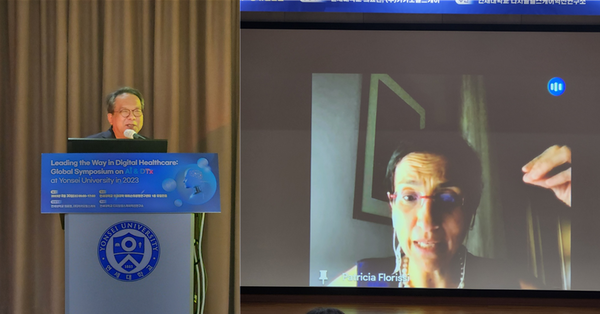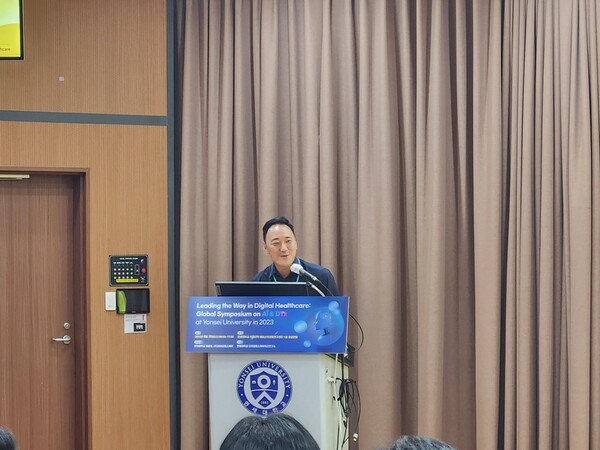With the emerging importance of language learning models (LLM) across various industries including the healthcare industry, Google Cloud and Kakao Healthcare representatives elaborated on its collaboration to use federated learning in healthcare and life sciences.

Federated learning is a machine learning technique that trains an algorithm on data from multiple independent institutions’ datasets, in a privacy-preserving manner.
This lecture was delivered at the Avison Biomedical Center of Yonsei Univeristy Medical College on Wednesday at the Global Symposium on AI & DTx cohosted by Yonsei University System and Kakao Healthcare.
Google Cloud CTO Patricia Florissi elaborated on how these LLMs evolved from an algorithm that was able to embed the semantic representation of individual words to enable translation and prediction of the next word to complete sentences. She explained that embedding semantic representation of words gave birth to these LLMs such as ChatGPT.
Similarly, Florrissi noted that the same concepts can also be applied to solve healthcare problems in genomics such as predicting the most likely codon to complete genomic sequences.
“A genome is also a sequence of letters and every genome represents amino acids and each sequence of amino acids represents proteins,” she said. “Consequently, we can apply this technology to proteomics to predict how proteins might fold.”
However, she highlighted that these models were not widely available due to concerns with AI such as transparency, security issues, and other concerns regarding hallucinations in LLM but now that the necessary policies and privacy protection rules have been applied, they can be widely implemented.
Particularly in healthcare, she noted that data is scattered across hospitals and locations worldwide but the data cannot be brought to a central repository due to security issues. Accordingly, she proposed to keep data within the region by copying it to nodes in the algorithm to keep the data in the respective locations.
“The platform sends the model to where the data is located to train on the data locally so its data does not leave the hospital,” explained Florissi. “However, the results of the model are sent back to a central platform, and model weights are combined to analyze the results while preserving privacy rules, local data regulations as well as general data protection rules (GDPR).”
Federated learning has huge potential and can now allow physicians worldwide and pharmaceutical companies to study electronic medical records (EMR), the effect of drugs, or results of clinical trials at a global scale without moving data from geographical locations, said Florissi.
Already Google Cloud and Kakao Healthcare are using Kakao Healthcare’s HRS service and Google Cloud’s Vertex AI to conduct a pilot project to implement federated learning using data from Severance Hospital and NCC in June.

Kakao Healthcare Director Cho Lio showed a demo of Kakao’s Healthcare’s healthcare data research suits (HRS) service. The pilot project is being conducted to predict the mortality of colon cancer patients who have undergone radical resection but are currently being trained on synthetic data. However, the director pointed out that the results of the federated learning pilot project managed to surpass that of other locally used algorithms to analyze data from the respective institutions.
However, Florissi warned that the appropriate business model is critical for federated learning success as it requires close collaboration. As there are costs to train the model on data, one possible business model is to divide the generated profits from the model proportionally based on the data contributed by respective hospitals.
Meanwhile, Kakao Healthcare CEO Hwang Hee also spoke about how the company is trying to integrate its four business areas of virtual care, data enabling, remote patient monitoring, and digital front door by aggregating healthcare data such as clinical data, genomic data, and patient-generated health data (PGHD) to create a digital healthcare ecosystem. In this regard, he noted several domestic and international collaborations with i-SENS and Norvo Nordisk to advance continuous glucose monitoring (CGM) for diabetes patients.
Related articles
- Huons expands free support for CGM device to ease financial strain on diabetic patients
- Kakao Healthcare, Novo Nordisk team up to develop digital health for people with diabetes
- Number of DTx license applications since April remains ‘zero’
- Kakao Healthcare, i-SENS to enhance diabetes care through CGM, digital health services
- Generative AI's infiltration of healthcare: insights from industry experts

